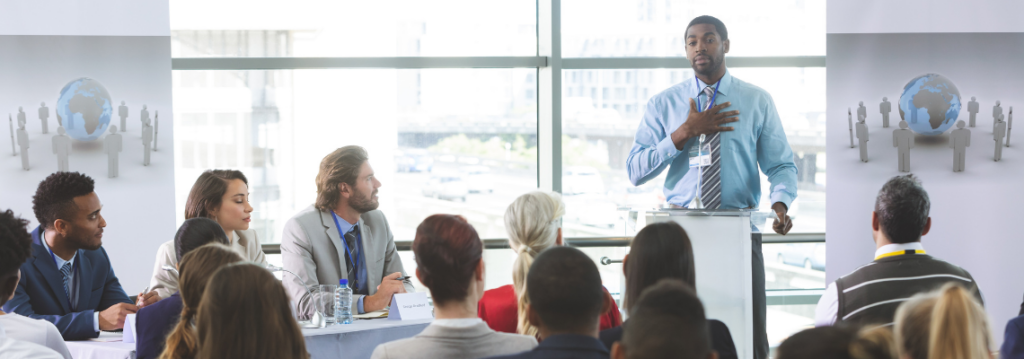During large corporate events and conferences, attendees often find themselves immersed in a whirlwind of new ideas, networking opportunities, and engaging presentations. However, once they return to their offices, the energy from the event can quickly dissipate into the demands of daily work. All that new learning and inspiration falls victim to merciless to-do lists and the forgetting curve, which posits that people forget 70% of what they hear within 24 hours unless they make an effort to retain it. Without a solid plan to reinforce the knowledge gained, valuable insights can easily fade away, leading to missed opportunities for growth, development, application, and business transformation.
Organizing large corporate events requires a significant investment of time, effort, and financial resources. To maximize the return on investment (ROI) of these events, organizers seek ways to ensure that participants derive long-lasting value and apply the knowledge gained in their professional lives. Incorporating recap sessions, scenario simulations, and experiential learning techniques can greatly enhance the ROI of corporate events.
Enhancing engagement and retention through experiential learning
Experiential learning posits that individuals learn best by doing, so learning experiences should go beyond passive listening by encouraging active participation and engagement. The traditional format of meetings (a series of presentations, award ceremonies, and speakers) relies on the presenter to engage participants. By incorporating experiential learning techniques, such as hands-on training sessions and team-based activities, event planners and meeting hosts can create personalized learning experiences that foster faster assimilation of knowledge and increase retention. Through collaboration and shared experiences, attendees are more likely to remember and apply what they’ve learned, leading to improved performance and greater impact back on the job.
Reinforce learning in a recap session
Recap sessions at the end of corporate events provide a crucial opportunity to consolidate the information shared throughout the meeting. Instead of leaving participants to rely solely on their notes and memory, recaps offer a structured review of the key takeaways, allowing participants to revisit important concepts, insights, and strategies to increase the likelihood of successful knowledge retention and application. Recap sessions also provide the opportunity for attendees to share their insights, exchange ideas, and reinforce connections made during the event.
One of the most effective ways to ensure that attendees apply what they’ve learned is through scenario simulations. While experiential learning increases engagement and recaps help reinforce knowledge, scenario simulations take the learning and meeting experience to a whole new level. A capstone simulation serves as the culmination of the event, bringing together the ideas and concepts shared by the various speakers and presentations and connecting them to the participants’ real-life contexts. Scenario simulations can take this newly gained knowledge and begin to turn it into useful skills that attendees can apply back on the job.
Key features of successful scenario simulations
- Customized learning content that applies the specific material and concepts from the meeting’s speakers, presentations, and workshops.
- Learning in context: Simulations enable participants to apply new knowledge, insights, and concepts to real-world challenges they will encounter in their roles.
- Real-time leaderboards: Introducing friendly competition through leaderboards fosters engagement and motivates active participation in the experience.
- Team-based discovery learning: Collaboration and peer learning are essential components of scenario simulations. Participants work together in teams, exchanging ideas, perspectives, and insights to solve complex problems. This team-based learning approach fosters a sense of camaraderie and encourages participants to tap into their collective knowledge and experience.
- Real-time flexibility: Some scenario simulations provide the flexibility to adjust the learning experience in real-time, adapting to the needs and dynamics of the participants. This ensures that the content remains relevant and up-to-date.
- The opportunity to fail forward: Allowing participants to navigate ambiguity and make mistakes in a safe environment provides a valuable opportunity for practical learning, skill development, and knowledge retention.
Moving past the traditional meeting format to improve corporate event ROI
In today’s fast-paced world, corporate event hosts and attendees are looking for unique experiences that make an impact and benefit the bottom line. Scenario simulations offer an immersive experience where attendees can actively apply their newly-acquired knowledge to solve real-world problems, ensuring that they leave with practical tools and skills to thrive in their roles. Get in touch with the Blueline team to learn more about how scenario simulations can turn your next major corporate event into a catalyst for lasting learning and transformation at scale.


